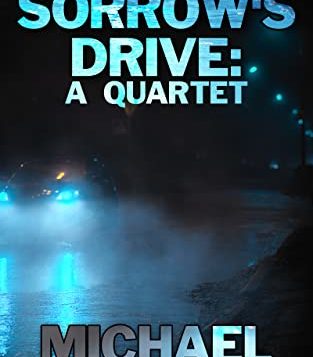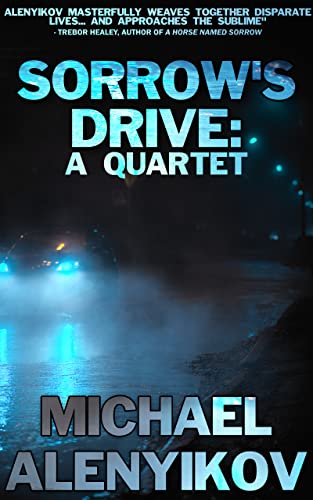Sorrow’s Drive consists of four novella-length stories about, yes, sorrow. Michael Alenyikov’s soft, deft hand wields an ethos as harsh as Greek tragedy. His humor attains surpassing cruelty. He knows how real sin is. Sins of omission concern him. Two of the stories address “ghosting,” that bloodless, cowardly cruelty that keeps its victim wondering and never grants the relationship a clean death.
“Wish You Were Here” is Willie’s story. He’s a UN peacekeeper who works in war and disaster zones where mortal danger is continual. People ask him why he chose his job. “I do it because I feel nothing,” he says, “and once, I thought, this will make me feel alive again.” People beg him for stories. His Swiss pickup, Hans, wants to “suck the reality out of him.” Willie regales them all with gore porn, though their admiration embarrasses him. The reader keeps wondering why he does this job, and with such obsessive fervor, such … love. Finally he tells us: “I want to be caught, to have it done with; to be condemned, whatever the crime. Perhaps this time I will get what I deserve.” He’s beyond masochism, reaching a towering sadism toward the self, mortal malice from Willie against Willie. Is he his own stand-in for our whole violent species, and is that why he offers himself on the altar of war? His words are Wagnerian in force, godlike in their finality.
“Mi Firenze” focuses on the preteen, pre-gay Riley and his grandmother Florence (Flo). Her lovers called her “mi Firenze” after the Italian city she loved as a young aspiring painter. In her last year, she has Riley read her journals and her unsent letters to Georgiana. Flo blew like a hot and violent wind through her intimates’ lives. She chose American domesticity over painting and Georgiana—the best luck Georgiana ever had, from what we know about Flo—and ghosted her guiltless friend. Flo’s guilt never left her alone; perhaps it tainted all her endeavors.
Abandonment spared Georgiana the forced marches in heatstroke weather and re-enactment of the wild dog attack at Subiaco from The Omen that another lover suffered instead. As in the film, the dog-attack scene is absurd. It’s as horridly funny as the film version. You’ll feel queasy with guilt for laughing, but you’ll laugh. And it’s harrowing despite the gall of these overprivileged narcissists running loose in a remote locale, feeling above danger in a country that’s not their own, risking rabies and dismemberment. It’s harrowing despite how richly they deserve their scare.
But failure was what really scared Flo. She exchanged possible failure as an artist and a woman’s lover for conclusive failure as a mother and a man’s wife. She has done everything but what really mattered and failed at every turn. She hopes that Riley will not reject his artistic vocation when that choice arrives for him.
On Boston’s Storrow Drive, the signage long promoted the Charles River Park apartment complex with the message: “If you lived here … you’d be home now.” Samuel doesn’t want to be home; his trip is “Sorrow’s Drive.” A nurse, Francis Grayson, has summoned him to settle his dead brother Peter’s affairs. So this will hurt as much as possible, Samuel drives cross-country to Boston, a Dantean descent into bleak midwinter, with motel beds and fast food to jump-start his penance.
When Samuel left his family, he stopped communicating with them. A hysterical response to sex play between cousins underlies this estrangement, though there’s more. No one ever risked the conversation that might have yielded rapport, a truce, a clean break—something more declarative and decent than decades of guilty ghosting.
Nurse Grayson wonders why Samuel abandoned dear old Peter, though eldercare workers know how families settle their scores against fading elders by abandonment. They’re surprised when it doesn’t happen. That’s straightforward enough. There’s something else that’s not, and that will mess with your head in ways you won’t see coming. Genuine startle factor is rare—harder to achieve than crude shock, and harder on the printed page than on film. It’s even harder with a book so clearly about justice rather than mercy, with an author who carries the scales in one soft, deft hand. Sorrow’s Drive reveals what’s in the other.








Discussion1 Comment
I’m surprised that Laura Argiri omits mention of Alenyikov’s gorgeous style, with lines such as “The sea glistened like a turquoise jewel that had melted in the sun.” About drinking champagne: “the fizz that lights my chest as if I’d swallowed a holiday sparkler…” Or “I’m trying to teach you something before it’s too late. Too late comes on you so fast.” This last line is a sentiment that describes many of the experiences in this excellent collection, though Argiri’s conclusions about the novellas don’t quite gibe with mine, especially concerning Grandma Flo, who is painted as full of guilt and as an “over-privileged narcissist” who deserves a scare in one scene. Not my take on the character at all. And Argiri’s line about the ending of “Sorrow’s Drive,” “Genuine startle factor is rare…” left me wondering what was so startling. These four novellas remind of Damon Galgut’s brilliant work in terms of the solitariness of the characters, yet Alenyikov turns more beautiful lines, which brighten every page and add evocative sensuality to his writing.